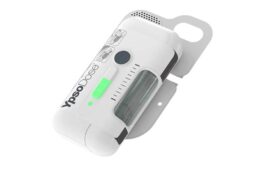Eisai Inc. announced that the FDA expanded the indication of its antiepileptic drug Fycompa (perampanel) CIII for monotherapy and adjunctive use in pediatric patients 4 years and older for the treatment of partial-onset seizures (POS) with or without secondarily generalized seizures. The approval includes both Fycompa tablet and oral suspension formulations.
“Eisai is working tirelessly to provide treatment options for patients of all ages to help better control seizures and achieve the ultimate goal of seizure freedom,” said Lynn Kramer, MD, chief clinical officer and chief medical officer, Neurology Business Group, Eisai. “We are excited about the potential of Fycompa as an important tool to reduce the incidence of seizures among pediatric patients living with epilepsy. This milestone underscores our commitment to providing treatment options for children with epilepsy for whom there is still a significant unmet need.”
Today, an estimated 470,000 children in the U.S. are living with epilepsy. Up to 40 percent will not achieve seizure freedom with existing treatment and will struggle with uncontrolled seizures.
“Taking an AED as prescribed every day is a critical part of reaching the goal of seizure freedom for pediatric patients,” said Jesus Eric Piña-Garza, MD, pediatric neurologist, Tri-Star Medical Group Children’s Specialists. “With Fycompa, children and their parents now have a once-daily dosing option with a long half-life that can fit into their increasingly busy lives.”
Some patients may also experience breakthrough seizures, which occur in individuals who have previously achieved reliable seizure control. Breakthrough seizures can be caused by any number of factors including illness and loss of sleep. Missed medication doses are the number one cause of breakthrough seizures. Fycompa has a long half-life and in a pharmacokinetic study, it has been demonstrated that in the event of a missed dose, plasma levels remain relatively stable.
The use of Fycompa for the treatment of partial-onset seizures in adolescents and children 4 to <12 years with epilepsy is supported by efficacy extrapolated from three Phase 3 adequate and well-controlled studies of Fycompa in adult patients with POS. Safety was evaluated in two studies in pediatric patients 4 to <12 years of age with epilepsy, a total of 225 patients received Fycompa, with 110 patients exposed for at least 6 months, and 21 patients for at least 1 year. Adverse reactions in pediatric patients 4 to <12 years of age were similar to those seen in patients 12 years of age and older.
Final results of these studies supporting the FDA approval in pediatric patients 4 years and older will be presented at an upcoming medical meeting.
Fycompa was initially approved for adjunctive use in POS in 2012, and was later approved as adjunctive therapy for PGTC seizures in patients with epilepsy 12 years of age and older, and then as monotherapy for POS with or without secondarily generalized seizures in patients with epilepsy 12 years of age and older. To date, Fycompa is approved in 55 countries and has treated more than 200,000 patients worldwide across all indications
(Source: Eisai Inc.)
Filed Under: Drug Discovery and Development




